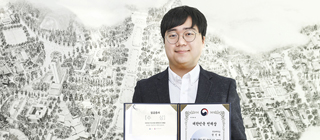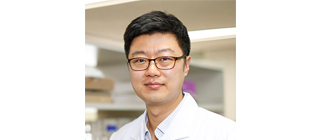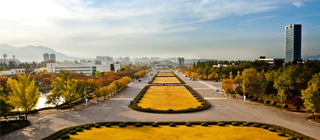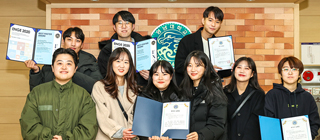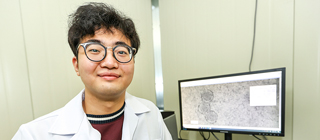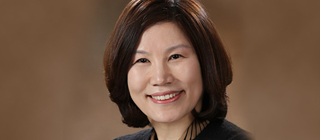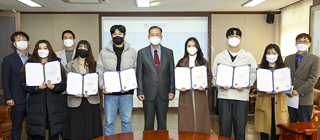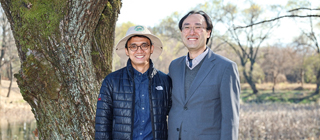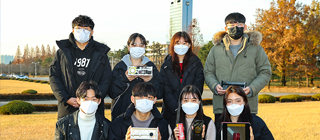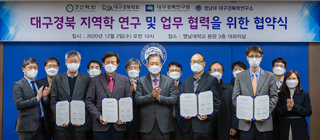-
Engaged in various social contribution activities at non-profit institutes such as UNICEF and the United Nations Volunteers Korea Goal to become a ‘mentor who shares with adolescents’ by gaining more experience while volunteering [December 30, 2020] YU Department of Statistics junior Han Jin-wook (23, photo above) won the ‘2020 Excellent Korean Award.’ The ‘Excellent Korean Award’ that is co-hosted by the Ministry of Education and the Korea Foundation for the Advancement of Science and Creativity finds and awards outstanding young Koreans who will lead Korea, and it is a talent selection program that began in 2008 to support them to grow into the main pillars of the nation in the future. Mr. Han received good evaluations for his various social contribution activities such as volunteering at non-profit institutes and charity drives for social welfare funds. He was recognized for his ongoing contributions in activities to help children not only in Korea, but around the world by participating in the UNICEF Daegu College Volunteer Corps and UN Volunteers Korea social media promotion team. He was selected as an outstanding participant by both of these groups and was awarded by both. This year, he served as the PR team leader at an organization called ‘Corona Helper’ when COVID-19 first started spreading earlier this year. He participated in funding projects pursued by this organization and delivered the earnings to local families in need. Mr. Han plans to take part of the reward from receiving the Excellent Korean Award and donate it to a local scholarship organization. He said that he volunteered continuously with his family since he was in elementary school and vowed to ‘become a person who can love neighbors who are in more need than me’ and said, “I think that a warm person makes the world brighter. I had personal hardships back in secondary school, too. I wanted to share my experience of overcoming my difficulties by participating in various volunteer activities with youths. I want to become a mentor that helps youths grow healthily.” He also added, “I plan to earn a youth instructor certificate and integrate my major in statistics and gain expertise in relevant fields such as utilizing it for systematic mentoring.” Meanwhile, the ‘2020 Excellent Korean Awards’ are held through document reviews including self-introductions, and then interviews to pick 50 high school and 50 college students for a total of 100 students around the nation, who are given the Vice Prime Minister and Minister of Education Award. The awards ceremony was held online on the Ministry of Education’s YouTube channel on December 30.
-
Joint research by YU Department of Biotechnology Professor Jin Joon-oh and University of Ulsan Medical School ‘TRIM28 and RLIM protein’ lung cancer early diagnosis predicts 5-year survival rate... Clinical applications expected Published in the latest issue of an international academic journal in cytobiology [December 28, 2020] Domestic researchers discovered a biomarker that can diagnose lung cancer, which is the top cause of cancer deaths among Koreans, early on. ‘Biomarkers’ can show changes in the body using cells in the body, blood vessels, proteins, DNA, RNA, etc. YU Department of Biotechnology Professor Jin Joon-oh (41, photo on left) conducted joint research with the University of Ulsan Medical School Professor Lee Chang-hwan’s research team and discovered a biomarker protein that can diagnose lung cancer and predict the five-year survival rate. In the case of lung cancer, there are no particular self-perceivable symptoms and there are few biomarkers for early diagnosis, thus having a self-diagnosis rate of just 20%. Though there are some materials presented as biomarkers for diagnosing lung cancer, there are difficulties in early diagnosis because there is a deficiency in particularities and sensitivity. When discovered early, the survival rate of lung cancer is high at 80%, and therefore, the research outcomes are receiving a great deal of attention from academia and medical circles. The research team conducted research on finding proteins showing significant difference in concentration in lung cancer tissues and normal tissues from 104 lung cancer patients. In result, they found that there was a considerably high concentration of the protein called ‘TRIM28’ in lung cancer tissue. It was found that there was severe proliferation and movement of lung cancer in the cell model for which genes were manipulated to artificially create high amounts of TRIM28 proteins and in rat models. Upon additionally checking the TRIM28 coupled proteins, the research team found the target protein RLIM decomposed by TRIM28. It was verified that RLIM decomposes MDM2 that breaks down p53, a well-known tumor-suppressing protein. In other words, it was found that TRIM28 adjusts RLIM and RLIM adjusts MDM2 to cause a chain decomposition reaction that adjusts p53 through cell and animal research. The research team analyzed the correlation of TRIM28, RLIM proteins and the five-year survival rate using tissue samples from 101 lung cancer patients, and learned that the TRIM28 manifestation rate was high and that the five-year survival rate of patients with high RLIM manifestation was significantly lower. The research team plans to proceed with clinical applications to use TRIM28 and RLIM as a biomarker for early diagnosis of lung cancer and for predicting the five-year survival rate, and also plans to conduct candidate material discovery research that can regulate TRIM28 and RLIM. Meanwhile, this study was conducted with the support of the Ministry of Science and ICT, National Research Foundation middle-grade research project, and basic research project, etc., and the research outcomes were published in the latest issue (Dec 17) in cytobiology international academic journal <Cell Death and Differentiation>.
-
-
Wins in various research sectors such as ‘best poster’ at international academic conference Recognized for research achievements regardless of undergraduate or graduate students Received attention from academic and industrial circles for studies on semiconductor applied new material and energy harvesting materials [December 18, 2020] <Undergraduate and graduate school students of the School of Materials Science and Engineering win numerous thesis awards at major academic conferences> Students of the YU School of Materials Science and Engineering were awarded in several major academic conferences this year, thus being recognized for their research capacities. In particular, both undergraduate and graduate students displayed outstanding research capacities in various research sectors. Two YU graduate school students received the ‘Best Poster Award’ at the international academic conference, ‘ENGE (Electronic materials and Nanotechnology for Green Environment) 2020’ held at the Ramada Plaza Jeju Hotel from November 1 to 4. Researchers from universities and research institutes from 17 countries around the world presented about 1,700 recent research outcomes at this international academic conference. Among them, Park Yang-gyu (25, second term in master’s course) and Choi Han-seung (26, first term in master’s course) from the YU Graduate School of Materials Science and Engineering both won the best poster award by presenting the research results for ‘Study on Hafnium Oxide (HfO2) New Materials Thin Film for Application in Thin Film Transistors’ and ‘Magnetic Field Energy Harvesting Technology.’ Students from the YU School of Materials Science and Engineering won thesis awards at the two academic conferences of the Korean Institute of Electrical and Electronic Material Engineers as they continued their research achievements. The KIEEME academic conference is Korea’s largest specialized academic conference related to electronic materials in Korea. An undergraduate research team composed of School of Materials Science and Engineering seniors Jang Jong-gwan (26), Seo Min-woo (25), Lee Sae-bom (25), Ha Dong-rim (25), Lim So-hee (24), Chae Yeon-gyeong (22), Baek Ga-eun (22), Kim Na-young (22), and Doh Ji-eun (22) presented the results of the ‘High Ductile Ceramic Materials Research’ at the fall academic conference, thus receiving the best poster award. In the summer academic conference held in July, Lee Seung-ah (21, junior) won the best poster award for the research achievements of the ‘Magnetic Energy Harvesting Technology Using Ceramic Materials’ and Lee Geon (21, junior) won the poster award for the research achievements for ‘Energy Storage Thin Film Capacitor Materials.’ The research of the winners were high performance new materials research applied to semiconductor transistor materials such as LCD and OLED and on energy storage materials and energy harvesting materials that can be used for electric vehicles and IoT devices. These have high academic research value and they are research contents of levels that can be applied in actual industry sites, thus receiving attention from the academic and industrial circles. School of Materials Science and Engineering Professor Lee Hee-young and Professor Ryu Jung-ho who advised these students said, “The students have been displaying outstanding research capacities from their undergraduate years, thus enhancing the qualitative levels of research they conduct when they go on to graduate school. As research capacities are passed on naturally from undergraduate to graduate school students, the research lab has been continuously pumping out excellent research achievements.”
-
Hosted by the Daegu National Science Museum on the theme of ‘Science Technology Around Us’ ‘Competition for Insemination,’ microscopic photo observing the sperm-ovum insemination and development process [December 17, 2020] Byun Do-gyeong (25, photo), a senior at the YU Department of Biotechnology, won the grand prize at the ‘2nd Science & Technology Photography Competition hosted by the Daegu National Science Museum. This contest that was held under the theme ‘Science Technology Around Us’ is a photo contest related to science technologies melted into our everyday lives and natural phenomena in fields such as ▲observation of nature ▲utilization of science technology, and ▲importance of science technology. Pieces were received until October 16 and on December 4, one grand prize, three second place awards, four third place awards, and 11 runners-up were awarded. In particular, Mr. Byun is a student of biotechnology who did not major in photography, nor enjoy it as a hobby. He won the grand prize by submitting a blow-up photo of what he saw regularly using a microscope while observing biotechnology phenomena. He titled his piece, ‘Competition for Insemination.’ Mr. Byun submitted a four-cut photo of his observations of in vitro fertilization of sperm and ovum using a microscope, which ended up winning the grand prize. He captured the insemination and development process by collecting sperm and ovum from test rats with photos. <Byun Do-gyeong’s grand prize-winning piece, ‘Competition for Insemination’> (Clockwise from top left: insemination, 2nd cell period, 4th cell period, morular and blastocyst) Mr. Byun said, “I submitted a biotechnological phenomenon that I studied at the school lab and that I observe regularly, so I was surprised to win the grand prize. I think this received good evaluations because the scientific phenomenon, which occurs around us but people cannot see with the naked eye, was captured with the microscope without adding to it at all.” Meanwhile, the Daegu National Science Museum plans to put on display the winning pieces during the month of December.
-
-
16 selected after being accredited in the five main capacities for YU’s ideal human resource ‘Y-type Human Resource’ Offering ‘special programs for strengthening employment capacities’ for Y-Masters [December 14, 2020] <2020 Y-MASTER Certification Ceremony> The YU Education Innovation Headquarters held the ‘Y-Master’ certification ceremony. At this ceremony that was held on November 30, 16 students accredited as ‘Y-Masters’ received certification plaques. ‘Y-Master’ refers to the core human resources of YU with the five key capacities (character, creativity, progressiveness, expertise, public nature) that are the ideal Y-type human resource that YU pursues. Last year, YU enacted the ‘Y-type human resource certification operation regulations’ and strengthened the Y-type human resource core capacities for YU students. The accreditation fields for Y-type human resources include the five fields of public nature, character, creativity, progressiveness and expertise. Public nature refers to altruistic cooperative capacities, character refers to harmonious character capacities, creativity refers to convergence creative capacities, progressiveness refers to global progressive capacities, and expertise refers to practical expertise. Certifications are granted by evaluating the major, general education courses, extracurricular programs, and self-led activities for each field. When accredited in all five areas, students are given the title of ‘MASTER’, when having four ‘ACE’, when having three ‘STANDARD’, when having two ‘PLUS’, and when be certified in one field, they are ‘BASE’. YU offers special programs for strengthening employment capacities for core human resources who are Y-Masters.Plans are to conduct 1:1 employment consulting, education on writing resumes, and simulated interview programs among Y-Masters who wish to receive such support.
-
Mr. ‘Nur Syamsi Muhammad’ graduate of Park Chung Hee School of Policy and Saemaul and former central public official of Indonesia Complicated 170-hour education course and passed theory and demonstration evaluation of the YU Department of Forest Resources and Landscape Architecture “I will learn ‘Korea’s advanced system’ in the forestry management and policy sector and propose application to Indonesia” [December 4, 2020] <Nur Syamsi Muhammad (left) from the Park Chung Hee School of Policy and Saemaul who became the first foreigner to receive the national official ‘forest commentator’ certification and Department of Forest Resources and Landscape Architecture Professor Lee Joo-hyung> YU (President Sur Gil-soo) graduated the nation’s first official ‘forest commentator’ as a foreigner. He is Department of Forest Resources and Landscape Architecture who graduated from the YU Park Chung Hee School of Policy and Saemaul. Mr. Syamsi enrolled in the forest commentator course offered by the YU Center for Continuing Education in July of this year prior to graduating from graduate school and completed a five-month course to become registered as Korea’s first foreign forest commentator in November. A ‘forest commentator’ is a commentator or instruction/educating expert equipped with expertise on the culture, education, history, etc. about forests who offers knowledge and information on forests through activities about forest culture and relaxation to the general public visiting forests. This is an official certification managed and issued according to the Forest Education Promotion Act (Forest Education Act) by the Korea Forest Welfare Institute under the Korea Forest Service. Certification is given to those who completed a total 170-hour education course and completed theoretical and demonstrative evaluations at a forest commentator education course operation institute certified by the Minister of the Korea Forest Service. In particular, the entire education course is offered in Korean, so it is quite difficult for foreigners. Mr. Syamsi said, “I wanted to learn about Korea’s forest management policies and systems that not only create a natural scenery, but also creates jobs through environmental preservation. I applied for the forest commentator course as an extension to my major and to be able to use it in practical work back in Indonesia. Mr. Syamsi majored in forestry in his undergraduate studies and worked as a public employee of Indonesia’s forest ministry since 2014, and is an expert in forestry working as a forestry expansion manager. At the Park Chung Hee School of Policy and Saemaul where he graduated from in August of this year, he majored in Forest and Environmental Policy at the Department of Sustainable Development. He can be said to be an expert with both theoretical and practical knowledge. Mr. Syamsi stated, “I began with the forest commentator course with some basic understanding on forest resources, but it was quite difficult because I had to take the classes and be evaluated in Korean. Taking Korean as a mandatory course while studying at the Park Chung Hee School of Policy and Saemaul helped greatly. In particular, I was able to pass the examination thanks to the guidance of Department of Forest Resources and Landscape Architecture Professor Lee Joo-hyung and help from my tutors.” He added, “As a public employee, I want to the theoretical and practical knowledge I gained while studying in Korea and reflect them in the forest resource management and policies in Indonesia. I would like to apply Korea’s advanced systems in the forest education sector that I learned while acquiring the forest commentator certification. Once I return to Indonesia, I plan to suggest the government about education and training programs, and operating certification courses.” YU is a consigned education institute for the Korea Forest Service’s forest commentator course. One group is recruited every year by the YU Center for Continuing Education for operation and the general education course is conducted by the YU Department of Forest Resources and Landscape Architecture. Starting with the first group in 2012, a total of about 360 forest commentators in 9 classes were fostered.
-
Praises for the ‘Mobile Smart Braille Printer & App’ submitted to the creative general design contest ‘Creative idea’ converging and integrating various majors including information communication, mechanics, and business administration YU students win the grand prize for the second consecutive year [December 2, 2020] <’IM.DOT’ team of YU that won the grand prize at the ‘2020 Engineering Festival’ creative general design contest> (Bottom left to righ: Koo Joon-beom, Ji Joon-young, Koh Se-rim, Park Yu-na / top left to right: Kwon Hyuk-joon, Yang Sung-eung, Kang Min-ji, Han Kuk-young) YU students won the grand prize at the ‘2020 Engineering Festival’ creative general design contest. YU won the grand prize in last year’s contest and won again this year for the second consecutive time. In the 2020 Engineering Festival’s ‘creative general design contest’ held from November 23 to 27, about 150 teams participated, revealing their creative ideas. The ‘IM.DOT’ team (advisor Kim Young-tak) comprised of nine juniors such as Koo Joon-beom (23), Ji Joon-young (23), Koh Se-rim (22), Park Yu-na (21) and Yang Sung-eun (21) of the Department of Information and Communication Engineering, Kwon Hyuk-joon (24), Han Kuk-young (24) and Kang Min-ji (21) of the School of Mechanical Engineering, and Kim Kyung-hee of the Department of Business Administration won the grand prize and received the Minister of Trade, Industry and Energy Award. The work submitted by ‘IM.DOT’ was the ‘mobile smart braille printer & app (IM.DOT).’ They developed a mobile braille printer and application for the visually impaired to address their inconveniences to distinguish objects in everyday life. It has higher recognition rates than bar code scanners used when scanning items, and it adjusts the speed of voice messages to greatly improve convenience. When the item bar code is scanned through the ‘IM.DOT’ application, the detailed product information is voice notified. By synchronizing the ‘IM.DOT’ app with the mobile smart braille printer, it can be printed in braille immediately. By using the memo pad function of the ‘IM.DOT’ application, it is possible to print a message directly on the mobile braille printer, therefore, making it possible for it to be used by the visually impaired. ‘IM.DOT’ team leader Park Yu-na said, “Our team came up with this idea after reading an article explaining that most beverage vending machines in the market do not have braille and the braille indicated on products for sale only offer limited information, causing inconveniences for the visually impaired. Our team worked hard for six months to produce an application that can offer detailed product information to the visually impaired using a smart device and to build a mobile braille printer prototype. We hope that it will help the visually impaired to live a more independent life. I believe that with a little more revisions and supplementation of product bar code information linking, it is a technology that can be commercialized.” The ‘IM.DOT’ team applied for a patent for the newly developed ‘mobile smart braille printer.’ Meanwhile, the ‘2020 Engineering Festival’ is an event sponsored by the Ministry of Trade, Industry and Energy and co-hosted by the Korea Institute for Advancement of Technology and the Engineering Education Innovation Association and this year, it was held under the theme, ‘Engineering Challenge Week, Continuing Challenge.’ This event was held contact-free using online platforms such as homepage and YouTube due to the COVID-19 pandemic.
-
YU Daegu-Gyeongbuk Development Institute Signs MOU with expert research institutes such as the Daegu-Gyeongbuk Society Expected to build cornerstone for regional studies to strengthen and innovate regional competitiveness [December 2, 2020] <The four institutes of YU Daegu-Gyeongbuk Development Institute, Gyeongsan Society, Daegu-Gyeongbuk Society, and the Daegu-Gyeongbuk Development Institute’s Daegu-Gyeongbuk Studies Research Center signed an MOU for research cooperation in regional studies> (From left to right: Chief Park Seung-hee, Chairman Sung Gi-joong, YU President Sur Gil-soo, Chief Kwak Jong-moo, Chariman Choi Cheol-young) The YU Daegu-Gyeongbuk Development Institute (Chief Park Seung-hee) teamed up with expert research institutes and academic societies to conduct full-fledged research on regional studies. The four institutes of the YU Daegu-Gyeongbuk Development Institute, Gyeongsan Society (Chairman Sung Gi-joong), Daegu-Gyeongbuk Society (Chairman Choi Cheol-young), and the Daegu-Gyeongbuk Development Institute’s Daegu-Gyeongbuk Studies Research Center (Chief Kwak Jong-moo) signed an MOU for regional studies cooperation at the main conference room on the third floor of the YU main building on the 2nd. The four institutes agreed to cooperate in joint research for regional studies of Daegu and Gyeongbuk, mutually cooperate in work, and construct an industry-academic-research cooperation system. There has been a recent rise of interest in regional studies research in both academia and socially. These specialized research institutes agreed to team up and therefore, it is expected that a foundation for regional studies research will be provided to strengthen and innovate regional competitiveness. YU Daegu-Gyeongbuk Development Institute Chief Park Seung-hee (Professor of Korean Language and Literature) said, “With this MOU, we now have the basis for establishing a Daegu-Gyeongbuk regional studies research system and inter-institution cooperation,” while adding, “The four institutes will take the initiative to construct pan-regional research solidarity and cooperation system to carry out various regional study-related projects such as constructing a Daegu-Gyeongbuk regional studies research platform, regional archive, regional study education governance, regional study-based industry-academic-research cooperation system.” Meanwhile, at the YU Daegu-Gyeongbuk Development Institute that was opened in March of 2019, there are around 10 regional studies experts including professors and researchers conducting research and a variety of projects. It carries out regional demographics, urban regeneration, historical and cultural resource study and research activities, and also offers general education classes on Daegu-Gyeongbuk regional studies and Gyeongsan studies.
